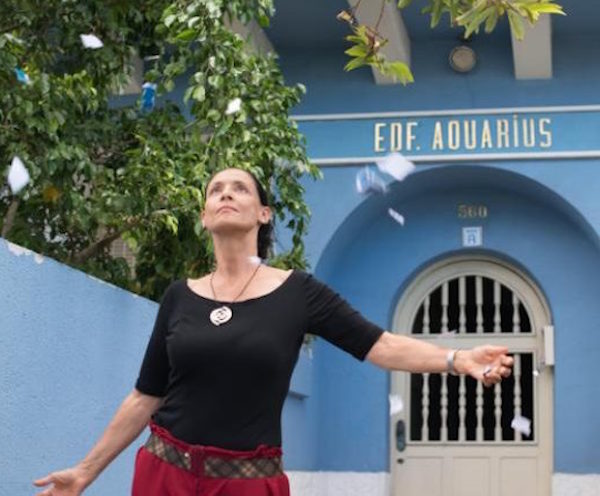Film Review: “Aquarius” — A Woman of a Certain Age Kicks Ass
How refreshing it is to see a female protagonist whose strength of will and character is not of the superhuman variety.
Aquarius, directed by Kleber Mendonça Filho. Screening at the Kendall Square Cinema, Cambridge, MA

Sonia Braga plays the resilient Clara in “Aquarius.”
By Peg Aloi
Tennessee Williams memorably commented on the importance of wealth for elderly women. In Cat on a Hot Tin Roof, Maggie says you have to either be young or with money because you can’t be old without it. Sophie Tucker put it more directly: From birth to age 18 a girl needs good parents. From 18 to 35 she needs good looks. From 35 to 55 she needs a good personality. From 55 on, she needs good cash.
Wealth and independence in old age are inevitably linked; the ability to continue to live alone comfortably is often seen as dependent on having the funds to afford servants for necessary tasks. In recent years, there’ve been some films that celebrate older women who wish to live alone on their own terms. In 2013’s Gloria, the main character has a love affair that ultimately fails to provide companionship but fulfills her need for sex. In 2015’s Grandma, Lily Tomlin plays a Bohemian academic who is terrible with money, not good at relationships, and yet completely fulfilled. (But then, it’s a comedy.) And in Nicole Holfocener’s Enough Said, Julia Louis-Dreyfus plays a massage therapist struggling with her exhausting job who envies a friend who writes and lives a leisurely life in her charming bungalow. The message is clear: getting older is tough on women, but money smooths things over nicely.
In Aquarius, we meet Dona Clara, a 65 year old widow (played by Sonia Braga) who lives on the beach in the Brazilian town of Recife. In her high-end neighborhood, Clara’s two-story building (called the Aquarius) is one of the only remaining low-rise structures built in the 1940s; it sits amongst massive high-rise residences. The film opens with beautiful black-and-white still photos that document the expansion of this picturesque beachside town into a densely populated city.
The story commences with a birthday party for Clara’s mother in 1980. Clara, a vibrant young mother in her 30s, walks on the beach with friends, and plays a cassette tape of Queen (“Another One Bites the Dust”) for them. During the party her mother recalls memories of her young lover and tells the crowd gathered that she has had a good life. We also learn that Clara has recently been fighting breast cancer. Her short hair is attractive, but we understand it is not her choice to wear it this way.
Fast forward to the present: Clara, fit and healthy with a luxurious mane of black silky hair, lives a pleasant life in her tasteful apartment. Her body shows the scars of a radical mastectomy. She walks to the beach, reads, writes, and listens to music from her vast vinyl collection. She has a friendly relationship with her longtime housekeeper Ladjane. Clara, who was widowed seventeen years earlier, is the last resident in her small apartment building; developers have bought out everyone else who lived there and the building is empty but for this last holdout, who refuses to sell her apartment. As the narrative moves along she is subjected to increasingly unpleasant situations brought on by the presence of the developers’ employees, who are doing construction work on the building.
As she deals with the stress of this situation, which is ginned up by her adult children who come to visit, Clara is also fighting to keep loneliness at bay. She goes dancing with friends, in a lively club where most of the revelers seem to be over 40. She jokes with her female friends over the gigolo one of them has hired, and agrees to dance with a handsome widower. Their fling barely begins when she tells him of her surgery and he balks. But she deals with the situation politely, even gracefully, as she does most things. Clara’s polite demeanor is rooted in the fact that she came from a “good” family. This civility is set in stark contrast to the bullying and crass behavior of the construction company’s owners and workers. Clara deals with their shenanigans by becoming increasingly defiant, indignant, and assertive.
Braga is a joy to watch in this naturalistic, intimate film. The director (Kleber Mendonça Filho) offers subtle commentary on Brazil’s contemporary mores, as well as on the country’s changing demographics, without becoming overtly political or didactic. Born in 1968, the Summer of Love, Filho is a child of the Age of Aquarius, and the cultural significance of that rebellious time hovers genially over the story. The director’s use of music is often funny, uplifting and thought-provoking, appropriate given Clara’s career as a music journalist. The climax and an abrupt ending are quite satisfying; one feels sure that the indomitable Clara will carry on indefinitely. How refreshing it is to see a female protagonist whose strength of will and character is not of the superhuman variety. Still, one wonders how a woman of similar age who has not been blessed with wealth might weather these same challenges.
Peg Aloi is a former film critic for The Boston Phoenix. She has taught film studies for a number of years at Emerson College and is currently teaching media studies at SUNY New Paltz. Her reviews have appeared in Art New England and Cinefantastique Online, and she writes a media blog for Patheos.com called The Witching Hour
